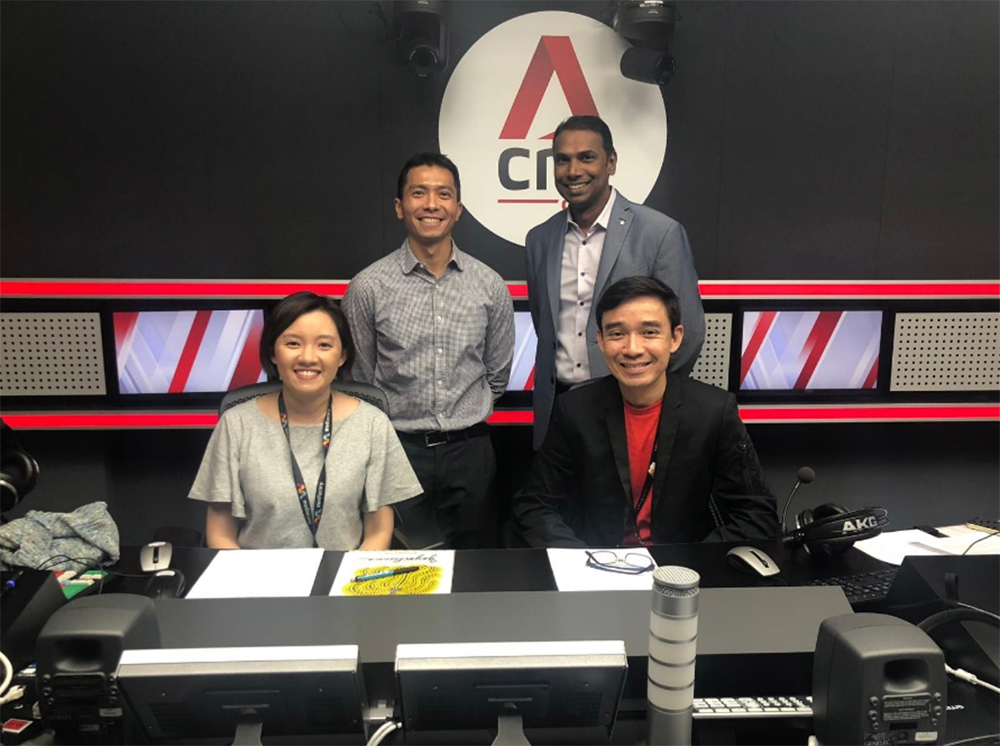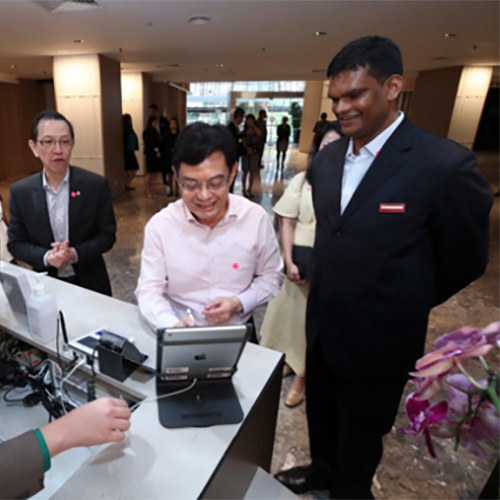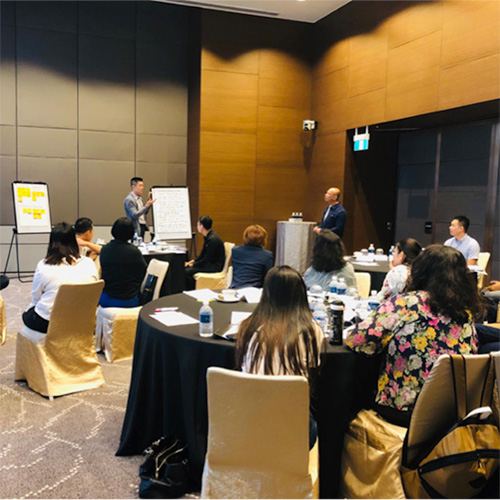Hear about the job redesign journey from M Social’s GM, Mr Pjey Mayandi

Top Left: Mr Kenneth Wong, Director, Workforce Singapore, Mr Pjey Mayandi, General Manager, M Social Singapore. Bottom Left: Chew Wui Lynn and Stanley Leong on Money Mind, CNA 938 , on 30 Sep 2019
M Social is one of the five pilot hotels in the Hotel Job Redesign Initiative. In this article, we got up close and personal with M Social Singapore’s General Manager, Mr Pjey Mayandi, as he shares with us M Social’s Job Redesign journey.
Hi Mr Mayandi, could you share with us your take on the Hotel Job Redesign Initiative?
We feel that Job Redesign is the way forward. It is a way that hotels can overcome manpower constraints and increase productivity while maintaining high-quality services with the automation of routine work. The Hotel Job Redesign Initiative encourages hotels to create higher quality jobs, become more manpower lean and productive, improving employees’ job satisfaction.
I understand you have introduced robots to take over some of the tasks – tell us more.
Millennium Hotels & Resorts has been heeding the government’s push for automation. Working with industry partners, we developed our robots AURA and AUSCA to increase productivity, optimise operations and enhance guest experiences starting with M Social Singapore.
AURA, South East Asia’s first Front-of-House Autonomous Service Delivery Robot, was launched in Dec 2016. AURA stands for Automated Room-Service Associate. AURA can deliver bottled water or extra towels right to your room. AURA can also call for the elevator and get to the correct floor, find the right room and call the guest on the room phone. She also knows how to avoid obstacles and give way to guests along the corridor.
One year later, we also successfully launched the world’s first Front-of-House Autonomous Service Chef Robot, ‘AUSCA’ to the hospitality industry, who prepares eggs for guests. Both robots were first launched at M Social Singapore and later adopted by the rest of the Singapore hotels in the Group.
How challenging was it to implement these changes, and was there any resistance to the introduction of the robots among the human staff? How were jobs redesigned as a result?
There were many considerations in integrating robots to our workforce. For example, AURA had to be integrated with the lift & PABX systems of the whole hotel. There was also a need for robotic mapping & configuration so that AURA could manoeuvre by herself. We did many surveys internally and externally, and tracked her performance. There were also other considerations like how we could develop our brand with automation and a thorough review of HR polices to improve talent management capabilities.
Technology and Job Redesign
AURA has helped our hotels manage daily tasks more efficiently. She has also given our hotels publicity by generating social media buzz. Our hotel staff have also learnt a new skill by working alongside a robot teammate. With time freed up, front office staff can also focus on higher value-adding tasks such as interacting with guests, enhancing their job skills e.g basic robotic operations and requests, and cross-deployment to other departments i.e. housekeeping.
As for AUSCA, the key objective is to relieve staff from simple but high volume and repetitive tasks so that resources can be deployed to more complicated tasks needing human attention to ensure consistent food and service quality. AUSCA is fully automated with minim al human intervention needed other than topping up of eggs. With AUSCA in-charge of the egg station at breakfast, cooking time per order reduced by 30% and our service staff had the opportunity to acquire new skills in handling equipment setup and simple troubleshooting. Guests were also amazed and satisfied with the ground-breaking technology.
How costly have these changes been, and do the benefits justify the cost? Are there any government grants to tap on?
Our studies showed a reduction of delivery time from an average of 15 minutes per delivery by a person to five minutes per delivery by a robot. An average delivery by a person will include two room requests at a time. Factoring this, AURA will save the property over eight man-hours every day. To add on, we see an improved room delivery process, which in turn leads to significant improvement in Guest Experience with the robotics delivery.
Apart from the mentioned benefits, embracing technology keeps the hotel relevant in the face of business disruptions. Costs are financially feasible in consideration of the service and productivity benefits. With funding support from STB and WSG available, our hotel’s adoption was a simple decision.
To add on, our internal audit shows at least 5 hours saved daily where our staff are trained in other areas of hospitality so they stay competitive in the market. Cross training to other departments is a way to alleviate manpower shortage and at the same time, improve the skill sets of our staff so they can be cross deployed to different departments i.e. housekeeping, food & beverage to tend to our guests’ needs.
M Social’s full case study can be found in the Hotel Job Redesign Toolkit.
Job Redesign Resources Available
Still unsure how you can start on your Job Redesign journey? Check out this video for available resources. You may also wish to visit the Hotel Job Redesign microsite to understand more.
;




